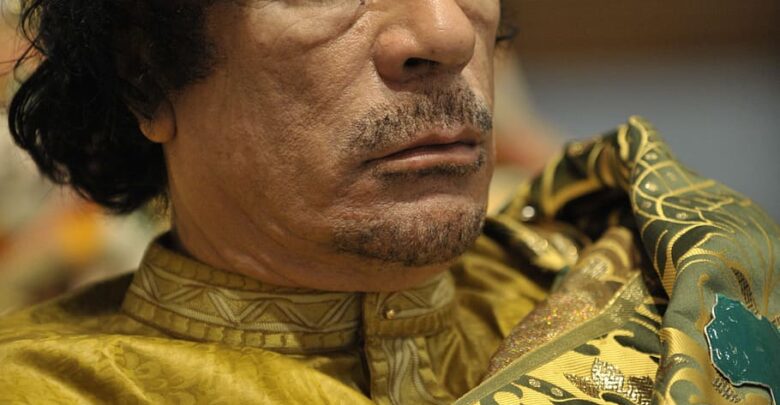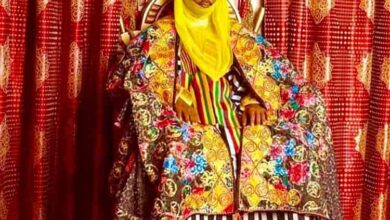The Truth About Gaddafi: He Was no Friend of Africans

Like in the tale of the elephant and the six blind men, dead Libyan strongman Col. Muammar Gaddafi seemed to various individuals as a different person, but he just wanted to govern them.
The majority of his compatriots regarded him as a brittle-skinned despot who never confronted criticism. He was viewed by the West as a narcissistic bloodsucker out to get them.
Gaddafi was referred to as “the mad dog of the Middle East” by the late US President Ronald Reagan”.
The Giver of Gifts, Gaddafi
Gaddafi was a hero on par with any that the continent has ever produced, though, in the eyes of many Africans.
Social media users frequently use his image as their profile photo or even post comments claiming that his assassination and removal from office stripped #AFRICA of its finest leader.
According to others, Gaddafi occupies the same lofty position in the pantheon of legendary African leaders.
Even today, many people on the continent name him in the same sentence as Kwame Nkrumah, Patrice Lumumba, and, yes, even Nelson Mandela.
How come? The fact that Gaddafi was never hesitant to stick it to the West contributed to this.
Gaddafi understood how to appeal to anti-imperialist sentiment in Africa for clear and justifiable reasons, whether at the United Nations (UN) or when he presided over African Union (AU) sessions.
Another method Gaddafi won over many people on his continent was by his propensity for bestowing gifts upon others.
There are several stories in the documentary “Mad Dog: The Secret World of Gaddafi” about persons who met “The Brother Leader” and left with large sums of money.
His generosity extended beyond only expensive cash. He also expressed his admiration in other, grander, and more enduring ways.
Also Read: The Green Book of Gaddafi’ Solution to the Problem of the Proper Instrument of Government
Who Muammar Gaddafi Really Is
Although Gaddafi spoke ceaselessly about “PanAfricanism,” he was really a bigot who thought that Africans were beneath him.
Finding out the truth about Gaddafi’s attitudes toward Africans is not difficult. Everything is public information.
For instance, Gaddafi publicly cautioned the #Europeans against admitting “ignorant” Africans over their borders since the “barbarians” will destroy their “advanced” continent during an official visit to Rome in August, 2010.
“We don’t know what will happen, what will be the reaction of the white and Christian Europeans faced with this influx of starving and ignorant Africans,” the man remarked.
“We don’t know if #Europe will remain an advanced and united continent or if it will be destroyed, as happened with the barbarian invasions,” he continued.
Gaddafi reportedly made all of these disgusting remarks while chatting with Silvio Berlusconi, who was the prime minister of Italy at the time, according to the BBC.
“Bring me that black slave”
Here is another account in case you’re still not persuaded that Gaddafi was a racist at heart. This was written by Nuri Al Mismari, the former head of Protocol under Gaddafi.
Regarding how Gaddafi used to discuss African politicians in private, Mismari had this to say to Al Hayat’s editor-in-chief Ghassan Charbel.
“Consider what Gaddafi used to tell me. Mismari referred to the president of an African nation who was about to visit him, saying, “Bring me that black slave.”
“And once the president had left, he would announce that the slave had disappeared. Give him a present.
The former Chief of Protocol said that Gaddafi hated Africans when Charbel questioned him about it. Even those whose praises made him happy. Mismari referred to his old boss’ description of them as stupid.
Also Read: Sub-Saharan Africa: History, Geography, Politics and Racist Undertone
King of Africa
Given how completely despised Africans were by Gaddafi, the continent wasn’t even his first choice for where to establish a monarchy.
He initially tested the charm offensive in the Middle East and Africa. His attempts were unsuccessful because many regional leaders recognized him as unstable and dangerous.
Gaddafi moved to Africa after failing in the Middle East. He wanted the rulers of Africa to submit to him as their proclaimed King.
At first, the affair was enjoyable for all parties involved, but then Gaddafi barked his fangs and showed who he really was.
African governments quickly realized that Gaddafi posed a threat if his demands weren’t met.
In West Africa, he unleashed the powers of hell through proxies like former Charles Taylor, the president of Liberia, received his funding and training.
Former U.S. Assistant Secretary of State for African Affairs Jendayi Frazer (born 1961) has claimed that during her time at the US State Department, a number of African leaders confided in her that Gaddafi had attempted to assassinate them.
King of Kings of the United States of Africa
Finally, even African leaders refused to support him. But Gaddafi remained obstinate. He believed that becoming the “King of Kings of Africa” was his divinely appointed destiny.
Gaddafi thus adopted a different strategy. He bought off traditional chiefs from all over the continent to declare him king instead of African officials, and they did.
He was anointed the “King of Kings of the United States of Africa” months before he was deposed and slain.
A ragtag group of traditional African authorities, some with questionable reputations, participated in and presided over the ritual. For instance, Kamlesh Pattni, a discredited conman turned evangelist, represented Kenya.
Even though Gaddafi must have understood his victory was hollow, he ultimately got what he wanted.
It’s tougher to dispel certain misconceptions than others. This must not be one of them. Gaddafi was prejudiced.
Praise for him as an African hero is evidence that his own frantic myth-making was more successful than he had anticipated.





